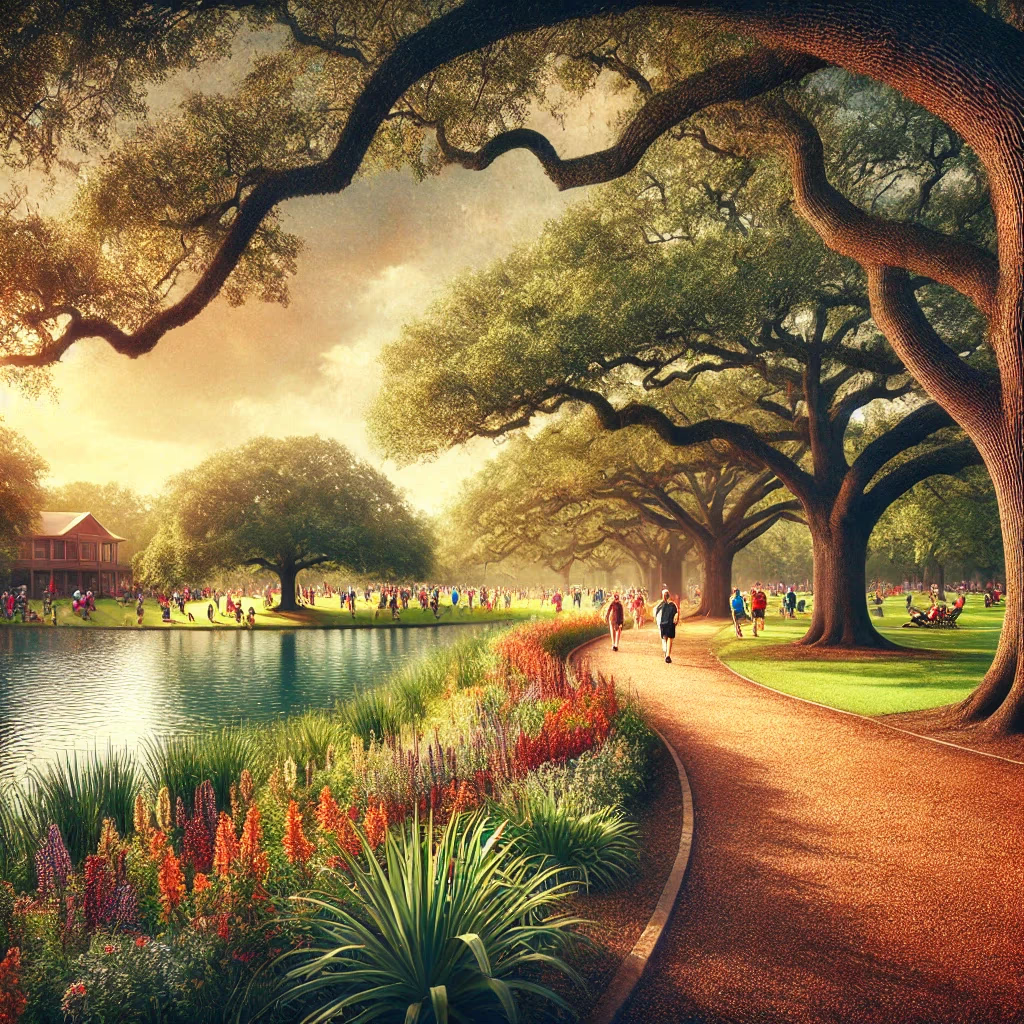Exploring Houston's Beautiful Parks
Date Published

- Home
- Blog
- Information
- Exploring Houston's Beautiful Parks
Houston, a sprawling metropolis known for its vibrant culture and economic prowess, is also home to an impressive array of green spaces that offer a refreshing escape from urban life. The city boasts over 350 parks, encompassing more than 10,000 acres of land dedicated to recreation, relaxation, and nature appreciation. These parks serve as vital lungs for the city, providing residents and visitors alike with opportunities to connect with nature amidst the hustle and bustle of city life.
From the expansive Hermann Park to the tranquil Buffalo Bayou Park, each green space presents a unique experience that reflects the diverse character of Houston. As one traverses the city, it becomes evident that these parks are not merely patches of grass but rather carefully curated environments that cater to a variety of interests. The lush landscapes are often dotted with walking trails, picnic areas, and playgrounds, making them ideal for families, fitness enthusiasts, and nature lovers.
The city's commitment to maintaining and enhancing these green spaces is evident in the ongoing development projects aimed at improving accessibility and amenities. This dedication ensures that Houston's parks remain vibrant and inviting, encouraging residents to explore the natural beauty that lies within their urban surroundings.
Key Takeaways
- Houston offers a variety of green spaces for residents and visitors to discover and enjoy.
- The city's parks feature unique landscapes that showcase the natural beauty of the region.
- Outdoor enthusiasts can partake in a wide range of activities, from hiking and biking to birdwatching and picnicking.
- Visitors can learn about the rich history and cultural significance of Houston's parks through educational programs and exhibits.
- Families can find plenty of fun and engaging activities for all ages to enjoy in Houston's parks.
Exploring the Unique Landscapes of Houston's Parks
Nature's Oasis in the City
The Houston Arboretum and Nature Center is a standout example, spanning 155 acres of preserved forest and wetlands. This urban sanctuary features five miles of trails that meander through various ecosystems, allowing visitors to fully immerse themselves in the sights and sounds of nature.
Education and Conservation
The arboretum serves as a living laboratory for environmental education, offering programs that highlight the importance of conservation and biodiversity. By doing so, it inspires visitors to take action in protecting the natural world.
Urban Innovation and Sustainability
Discovery Green, located in downtown Houston, is another remarkable park that showcases innovative landscape architecture. This 12-acre urban park features a man-made lake, gardens, and an amphitheater that hosts a variety of cultural events throughout the year. The park's design incorporates sustainable practices, such as rainwater harvesting and native plant landscaping, which enhance its aesthetic appeal while promoting ecological health.
Enjoying Outdoor Activities in Houston's Parks
Houston's parks are a haven for outdoor enthusiasts, offering a plethora of activities that cater to all ages and interests. For those seeking physical challenges, the city's extensive network of trails provides ample opportunities for hiking, biking, and jogging. The Buffalo Bayou Trail, for instance, stretches over 15 miles along the scenic bayou, offering picturesque views of the waterway and the city skyline.
Cyclists and runners can enjoy a well-maintained path that meanders through lush greenery and connects various parks along the route. In addition to traditional outdoor activities, many parks host organized sports leagues and fitness classes that encourage community participation. Hermann Park features tennis courts, golf courses, and even a miniature train ride that delights children and adults alike.
The park's open spaces are often filled with families playing frisbee or picnicking under the shade of ancient oak trees. Moreover, seasonal events such as outdoor movie nights and yoga sessions in the park foster a sense of community while promoting an active lifestyle.
Learning about the History and Culture of Houston's Parks
Park NameHistorical InformationCultural Significance
Hermann Park
Established in 1914, named after George Hermann
Home to Miller Outdoor Theatre and Japanese Garden
Buffalo Bayou Park
Historic waterway used for transportation and industry
Features public art installations and cultural events
Memorial Park
Originally a military training camp during World War I
Hosts cultural events and outdoor activities
The parks of Houston are not only places for recreation but also repositories of history and culture that reflect the city's rich heritage. For instance, Sam Houston Park is one of the oldest parks in Houston and serves as a living museum showcasing historic homes from the 19th century. Visitors can explore these restored structures and gain insight into the lives of early Houston residents.
The park also hosts various cultural events throughout the year, celebrating the diverse communities that have shaped the city. Another significant site is Emancipation Park, which holds deep historical importance as a gathering place for African Americans since its establishment in 1872. Originally purchased to commemorate Juneteenth—the day marking the end of slavery in Texas—this park has evolved into a vibrant community hub.
It features a recreation center, sports facilities, and beautifully landscaped gardens that honor its legacy while providing space for contemporary cultural events. Emancipation Park stands as a testament to Houston's commitment to preserving its history while fostering inclusivity and community spirit.
Finding Family-Friendly Fun in Houston's Parks
Families seeking quality time together will find an abundance of family-friendly activities in Houston's parks. Many parks are equipped with playgrounds designed for children of all ages, ensuring that little ones have safe spaces to play and explore. For example, Memorial Park features an expansive playground area surrounded by picnic spots where families can gather for lunch after a day of fun.
The park's natural setting encourages children to engage with their environment while developing their physical skills. In addition to playgrounds, many parks offer educational programs tailored for families. The Children's Museum Houston often collaborates with local parks to host outdoor science workshops and nature walks that inspire curiosity about the natural world.
These programs not only provide entertainment but also foster learning experiences that families can enjoy together. Seasonal festivals held in various parks further enhance family engagement by offering activities such as face painting, arts and crafts, and live performances that create lasting memories.
Experiencing the Wildlife and Nature of Houston's Parks
Wildlife Sanctuaries in Houston's Parks
The diverse ecosystems found within Houston's parks provide a sanctuary for various wildlife species, making them ideal locations for nature enthusiasts and birdwatchers alike. The Armand Bayou Nature Center is particularly noteworthy for its rich biodiversity; it encompasses over 2,500 acres of wetlands, forests, and prairies that support an array of wildlife including alligators, deer, and numerous bird species.
Exploring Houston's Natural Havens
Visitors can explore this natural haven through guided tours or self-guided trails while learning about the importance of preserving these habitats. By doing so, they can gain a deeper appreciation for the delicate balance of ecosystems and the vital role that these parks play in supporting local wildlife.
Stargazing in Houston's Parks
In addition to Armand Bayou, other parks like Brazos Bend State Park offer opportunities for stargazing due to its minimal light pollution. The park features an observatory where visitors can gaze at celestial wonders while enjoying the tranquility of nature at night. Such experiences highlight how Houston's parks serve as vital refuges for both wildlife and people seeking solace in nature's beauty.
A Refuge for Both Wildlife and People
Houston's parks provide a unique opportunity for people to connect with nature and escape the hustle and bustle of city life. By preserving these natural areas, the city is not only protecting local wildlife but also providing a valuable resource for its residents and visitors.
Unwinding and Relaxing in Houston's Serene Parks
For those looking to escape the fast pace of city life, Houston's parks provide serene environments perfect for unwinding and relaxation. The tranquil waters of Buffalo Bayou Park invite visitors to take leisurely strolls along its banks or simply sit on a bench while enjoying the soothing sounds of nature. The park’s lush landscaping creates an oasis where one can disconnect from daily stresses and immerse themselves in peaceful surroundings.
Moreover, parks like Hermann Park feature beautiful gardens such as the McGovern Centennial Gardens, which offer meticulously designed landscapes filled with vibrant flowers and serene water features. These gardens provide ideal spots for meditation or quiet reflection amidst nature’s splendor. Whether it’s reading a book under a shady tree or practicing mindfulness by a pond, these serene spaces encourage individuals to slow down and appreciate the beauty around them.
Supporting Conservation and Preservation Efforts in Houston's Parks
As urbanization continues to encroach upon natural spaces, supporting conservation efforts in Houston's parks has become increasingly vital. Various organizations work tirelessly to protect these green spaces through initiatives aimed at habitat restoration, pollution reduction, and community engagement. The Houston Parks Board plays a crucial role in advocating for park preservation while promoting sustainable practices that enhance ecological health.
Community involvement is also essential in these conservation efforts; volunteers regularly participate in clean-up events or tree-planting initiatives that contribute to maintaining the beauty of local parks. Educational programs aimed at raising awareness about environmental issues further empower residents to take action in preserving their natural surroundings. By fostering a sense of stewardship among citizens, these efforts ensure that future generations can continue to enjoy the rich landscapes and recreational opportunities offered by Houston’s parks.
If you're interested in exploring more about Houston's vibrant community spaces, you might want to check out how the city's Warehouse District has transformed into a bustling hub for live music and nightlife. This evolution is detailed in an article that discusses the emergence of EaDo (East Downtown Houston) as a premier destination for music lovers and night owls alike. To learn more about this exciting development in Houston's cultural scene, you can read the full article here.
